2012中考一轮复习精品课件(含2011中考真题)英语外研版八下Modules6-10(69张ppt)
文档属性
| 名称 | 2012中考一轮复习精品课件(含2011中考真题)英语外研版八下Modules6-10(69张ppt) |
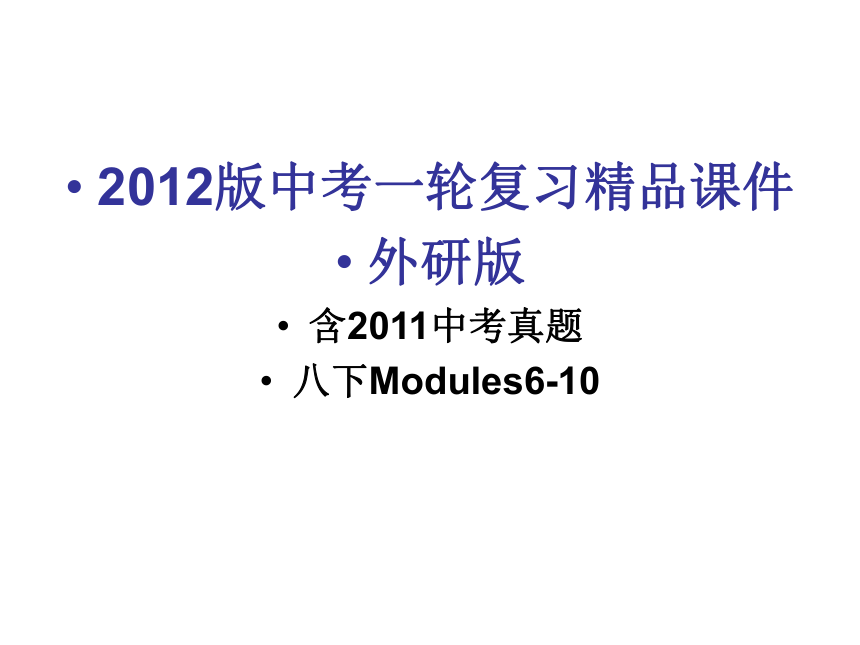
|
|
| 格式 | rar | ||
| 文件大小 | 555.3KB | ||
| 资源类型 | 教案 | ||
| 版本资源 | 通用版 | ||
| 科目 | 英语 | ||
| 更新时间 | 2012-01-16 00:00:00 | ||
图片预览

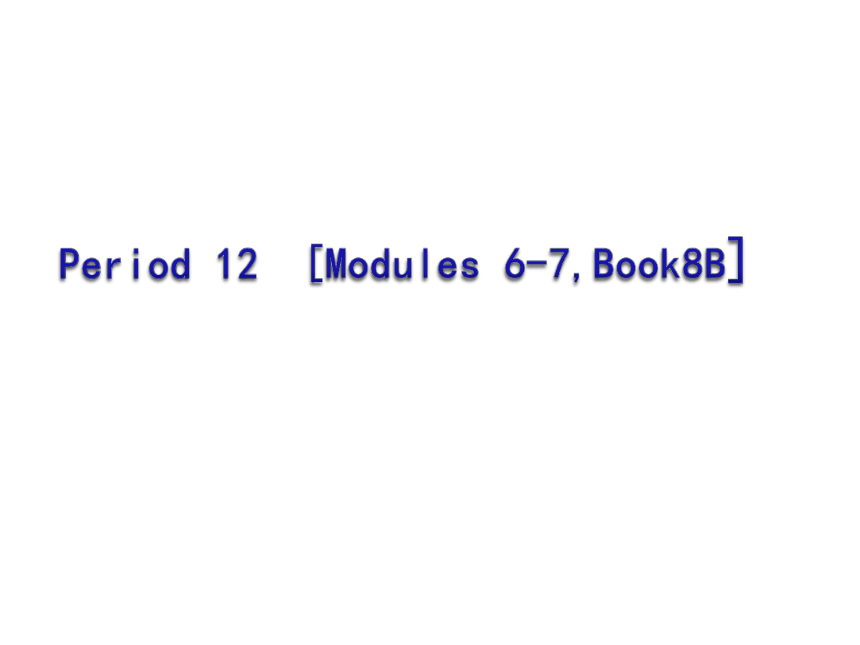
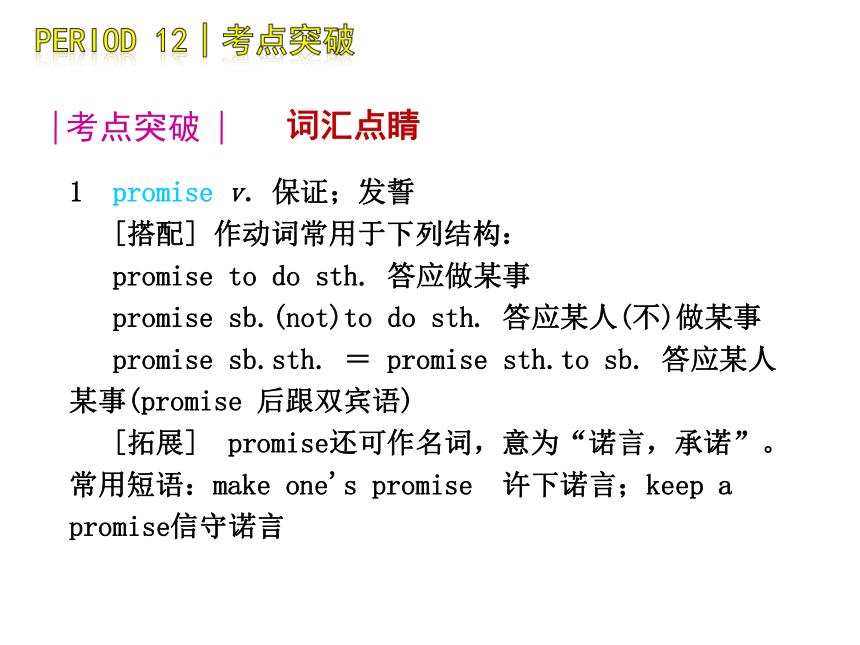
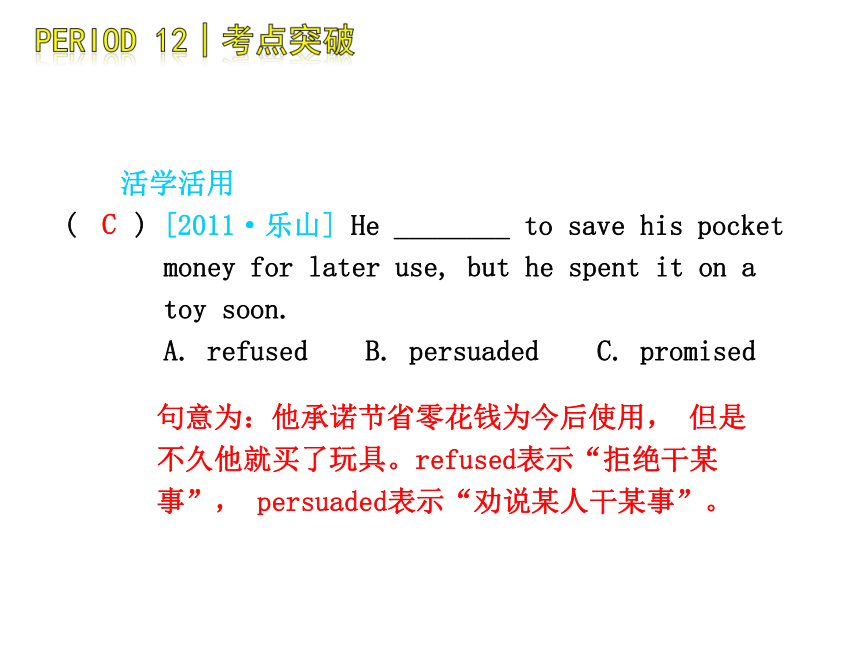
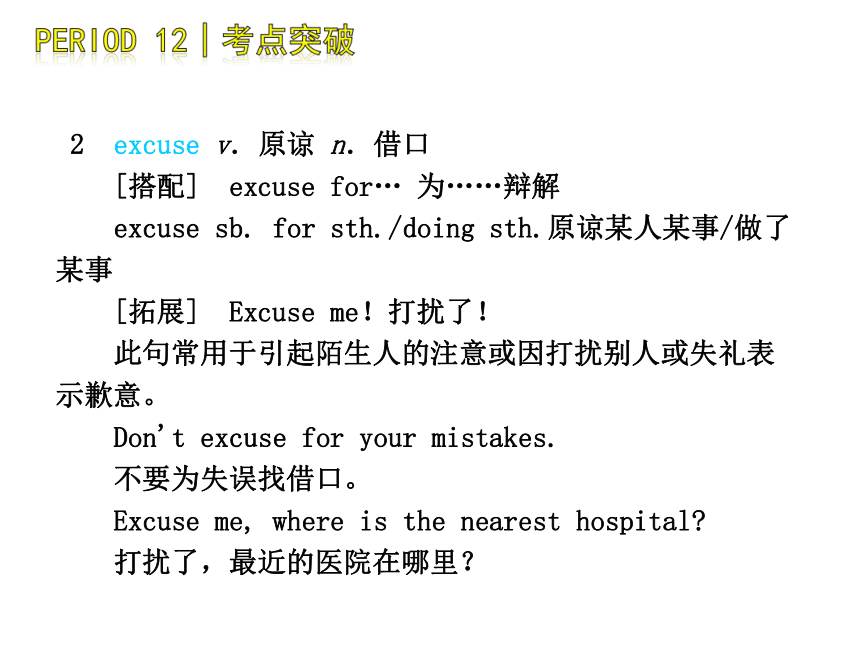
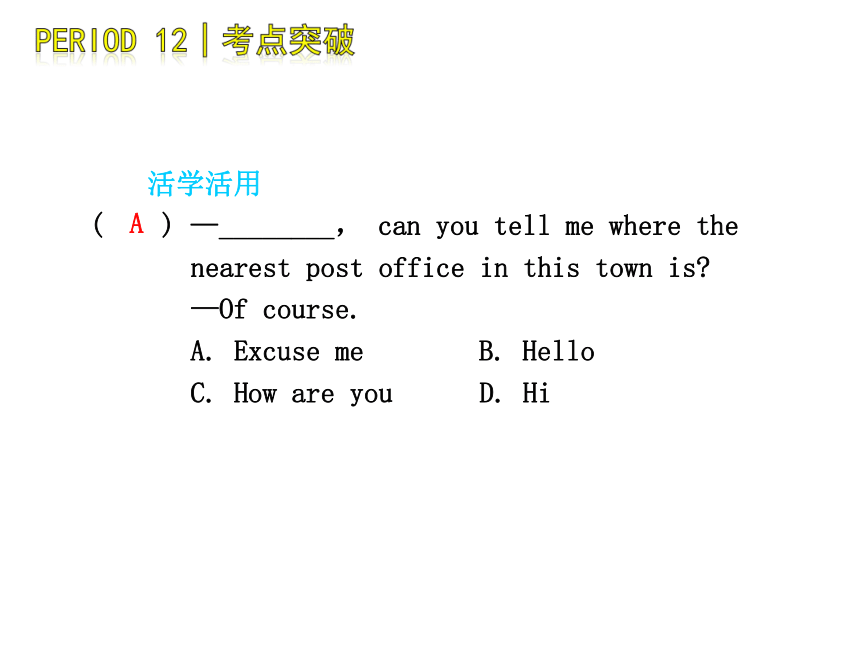
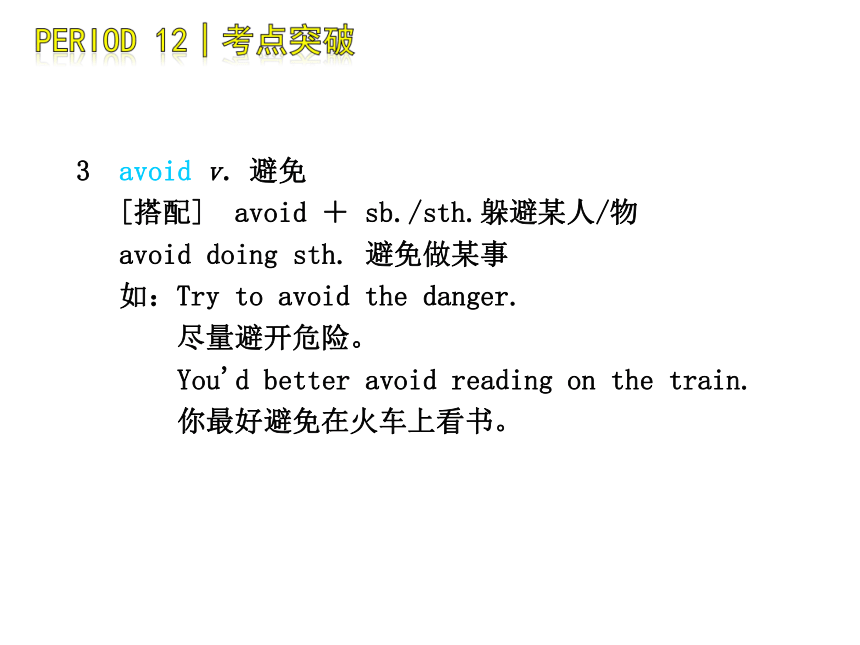
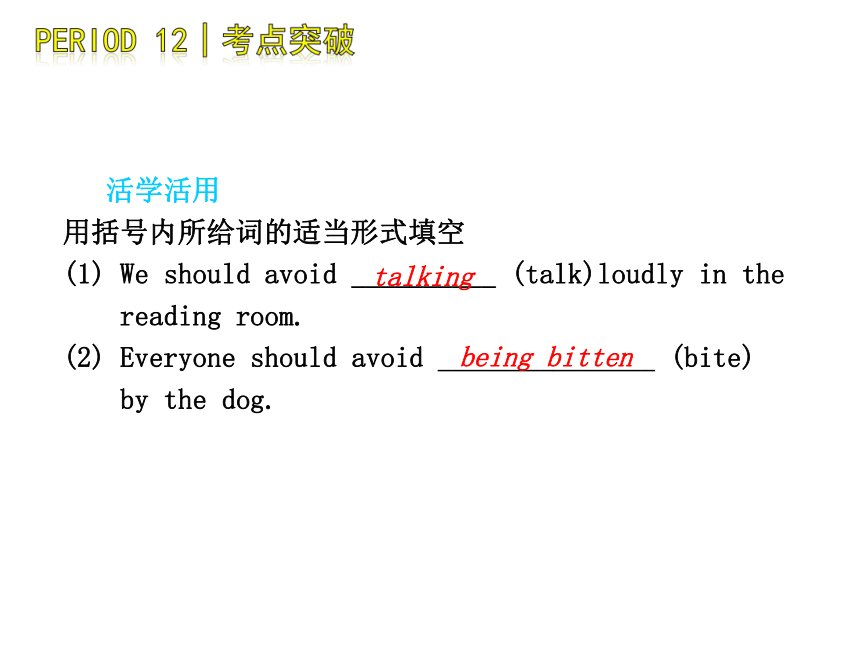
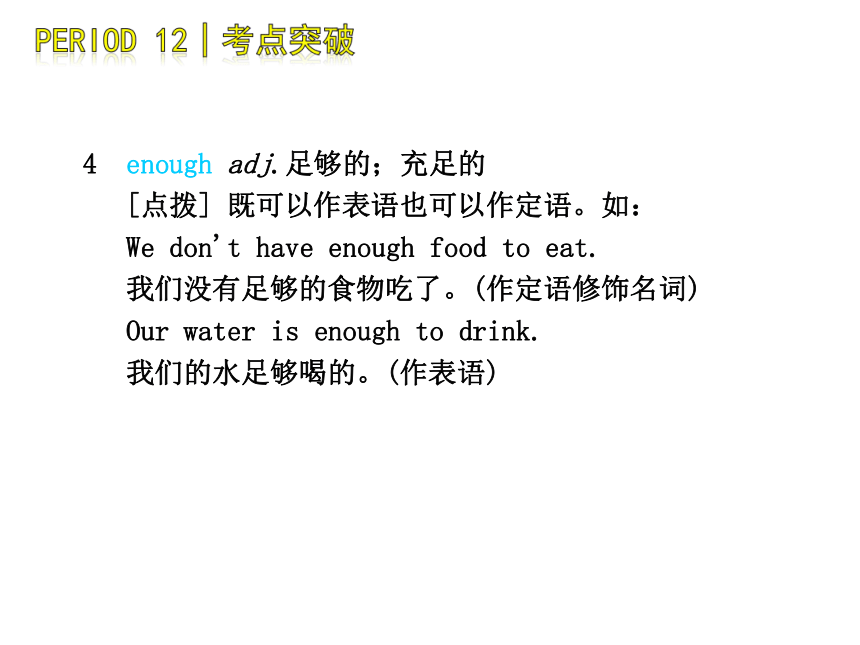
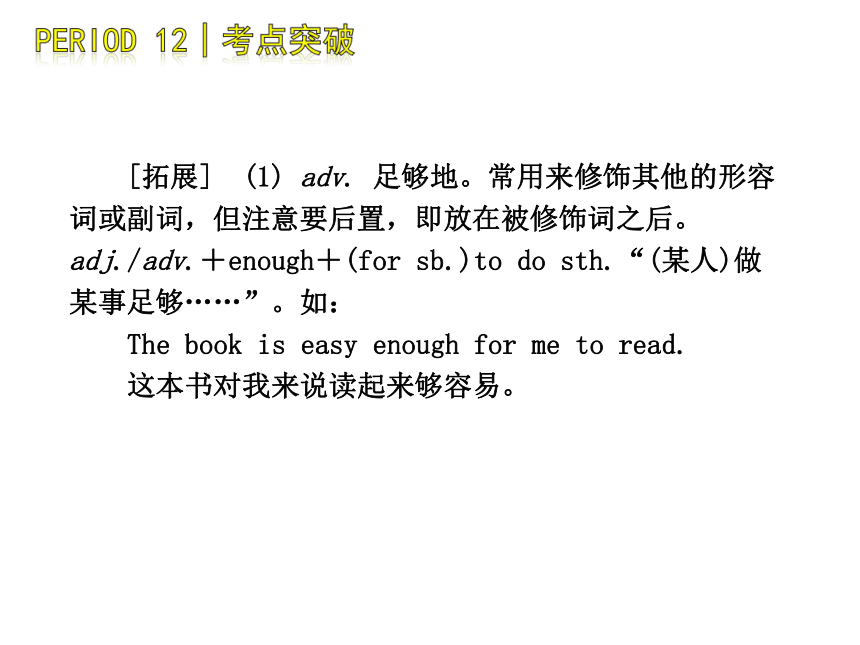
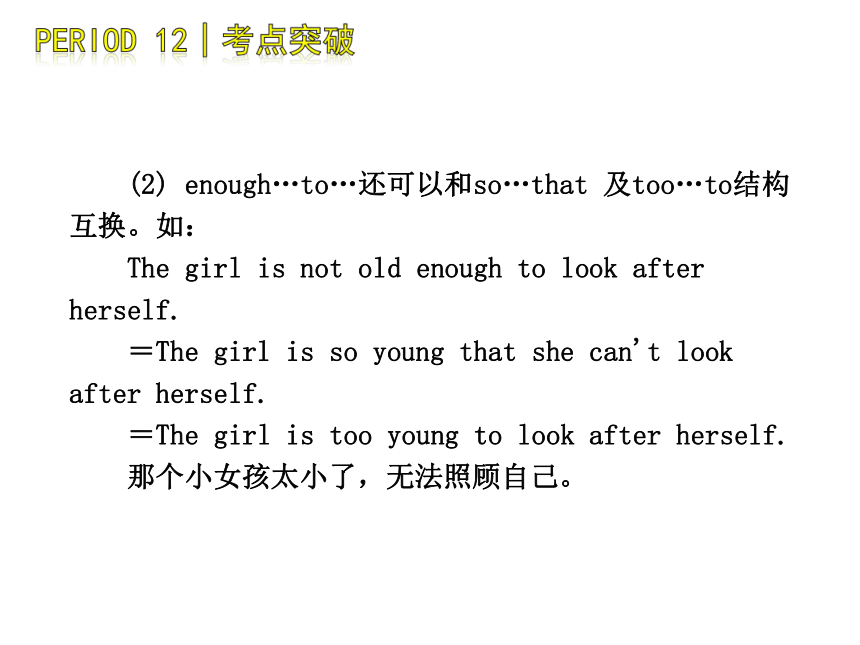
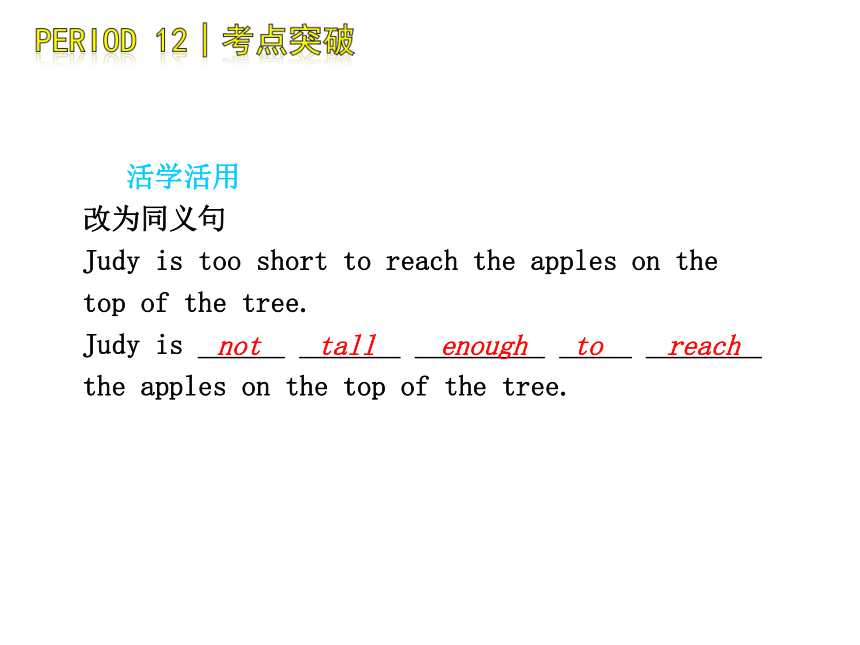
文档简介
(共69张PPT)
2012版中考一轮复习精品课件
外研版
含2011中考真题
八下Modules6-10
·外研版(衔接)
·外研版(衔接)
词汇点睛
考点突破
1 promise v.保证;发誓
[搭配] 作动词常用于下列结构:
promise to do sth. 答应做某事
promise sb.(not)to do sth. 答应某人(不)做某事
promise sb.sth. = promise sth.to sb. 答应某人某事(promise 后跟双宾语)
[拓展] promise还可作名词,意为“诺言,承诺”。常用短语:make one's promise 许下诺言;keep a promise信守诺言
·外研版(衔接)
活学活用
( ) [2011·乐山] He ________ to save his pocket
money for later use, but he spent it on a
toy soon.
A. refused B. persuaded C. promised
C
句意为:他承诺节省零花钱为今后使用, 但是不久他就买了玩具。refused表示“拒绝干某事”, persuaded表示“劝说某人干某事”。
·外研版(衔接)
2 excuse v.原谅 n.借口
[搭配] excuse for… 为……辩解
excuse sb. for sth./doing sth.原谅某人某事/做了某事
[拓展] Excuse me!打扰了!
此句常用于引起陌生人的注意或因打扰别人或失礼表示歉意。
Don't excuse for your mistakes.
不要为失误找借口。
Excuse me, where is the nearest hospital
打扰了,最近的医院在哪里?
·外研版(衔接)
活学活用
( ) —________, can you tell me where the
nearest post office in this town is
—Of course.
A. Excuse me B. Hello
C. How are you D. Hi
A
·外研版(衔接)
3 avoid v.避免
[搭配] avoid + sb./sth.躲避某人/物
avoid doing sth. 避免做某事
如:Try to avoid the danger.
尽量避开危险。
You'd better avoid reading on the train.
你最好避免在火车上看书。
·外研版(衔接)
活学活用
用括号内所给词的适当形式填空
We should avoid __________ (talk)loudly in the
reading room.
(2) Everyone should avoid _______________ (bite)
by the dog.
talking
being bitten
·外研版(衔接)
4 enough adj.足够的;充足的
[点拨] 既可以作表语也可以作定语。如:
We don't have enough food to eat.
我们没有足够的食物吃了。(作定语修饰名词)
Our water is enough to drink.
我们的水足够喝的。(作表语)
·外研版(衔接)
[拓展] (1) adv. 足够地。常用来修饰其他的形容词或副词,但注意要后置,即放在被修饰词之后。
adj./adv.+enough+(for sb.)to do sth.“(某人)做某事足够……”。如:
The book is easy enough for me to read.
这本书对我来说读起来够容易。
·外研版(衔接)
(2) enough…to…还可以和so…that 及too…to结构互换。如:
The girl is not old enough to look after herself.
=The girl is so young that she can't look after herself.
=The girl is too young to look after herself.
那个小女孩太小了,无法照顾自己。
·外研版(衔接)
活学活用
改为同义句
Judy is too short to reach the apples on the top of the tree.
Judy is ______ _______ _________ _____ ________ the apples on the top of the tree.
not
tall
enough
to
reach
·外研版(衔接)
句型透视
No,she missed the final practice so that Kylie
could play this piece of music on her own.
不,她错过了最后的练习为的是让凯莉能独自演奏这首
曲子。
[点拨] so that 意为“目的是”,引导目的状语从句,其从句中的谓语动词通常和can, may, should等情态动词连用,而且主句和从句之间不使用逗号。
·外研版(衔接)
[拓展] (1)in order that 为了;以便于
He got up early in order that (so that) he could
catch the bus. 他早早地起床为的是能赶上公共汽车。
(2)in order to 为了
He got up early in order to catch the bus.
为了能赶上公共汽车,他早早地起床。
(3)so…that… 如此……以至于……,引导结果状语从句。
He got up so early that he caught the bus.
他起床如此早以至于赶上了公共汽车。
·外研版(衔接)
活学活用
( ) (1)[2011·福州] —You study ________ hard
______ you're sure to pass the exam.
—Thank you for saying so.
A. enough; to B. as; as
C. so; that
C
句意为: “你学习如此地努力以至于你肯定能通过考试。”“谢谢你这么说。”
·外研版(衔接)
( ) (2)They develop their skills ________ they
can do things better and better.
A. however B. because
C. since D. so that
D
句意为: 他们拓展技能是为了能够把事情做得越来越好。后面的从句表示目的。
·外研版(衔接)
2 —I'd like to go with you! “我想和你一起去!”
—So would I! “我也这样想!”
[点拨] “so+be动词(助动词或情态动词)+主语”这是一个倒装句,表示前面句子所描述的情况也适用于另一主语。这种句式中,前后两个主语不同。如:
Kate can speak French, so can Bob.
凯特会说法语,鲍勃也会。
·外研版(衔接)
[拓展] (1)neither/nor+do/does(be,have,can,will) +主语。表示前面所说的情况同样不适用于后面。
He can't speak Japanese and neither can I.
他不会说日语,我也不会。
注意:掌握本组语法的关键:
①so用于肯定句,neither/nor用于否定句;
②分清是“赞同”还是“另一主语的情况也是如此”;
③前后两分句的时态保持一致。
·外研版(衔接)
(2)还有类似的一种结构,请同学们区别:
“so + 主语 + be动词(助动词或情态动词)”这种句式常用来对前面所说的情况表示赞成或认可。此结构中前后两个主语是同一个人或物。如:
—Henry is a good student. 亨利是个好学生。
—Yes, so he is. 对,他的确是个好学生。
·外研版(衔接)
活学活用
( ) (1) [2010·自贡] —I heard Yang Yan made
an English speech at the graduation
ceremony(典礼)yesterday.
— ________, and ________.
A. So she did; so did I
B. So did she; so I did
C. So she was; so I was
A
·外研版(衔接)
( ) (2) [2011·兰州] —I have changed my job.
—________.
A. So do I B. So have I
C. So I do D. So I have
B
答句句意为“我也换了工作”, 上句是由have构成的完成时态, 因此答句由have/has构成完全倒装句。
·外研版(衔接)
They don't learn any life skills until they go to
college. 他们直到上了大学才学一些生活的技能。
[点拨] not…until/till…意为“直到……才……”,表示前面的动作直到后面这一时间才发生,常与表示瞬间动作的动词(非延续性动词)连用。若主句为一般将来时,从句要用一般现在时。
[拓展] until/till…用于肯定句中时,意为“直到……为止”,其谓语动词为延续性动词。
He waited until/till his father came back.
他一直等到父亲回来。
·外研版(衔接)
活学活用
( ) [2011·泰安] —Mom, shall we have supper now
—Oh, we won't have supper ________ your dad
comes back.
A. until B. since
C. while D. after
A
·外研版(衔接)
高频考点
( ) 1. [2011·湘潭] ________ Zhai Xiaowei has only
one leg, he can dance wonderfully.
A. Though B. But C. So
A
题意为虽然翟小伟只有一条腿,但他舞跳得非常好。though表示“虽然、尽管”,相当于although; but表示“但是”,只能用在句中; so表示“所以”。
·外研版(衔接)
( ) 2. —What was your brother doing at this time
yesterday
—He was reading a magazine ________ I was
writing an e mail at home.
A. as soon as B. after
C. until D. while
D
考查连词的用法。 as soon as“一……就……”;
after “在……之后”; until“直到……”;
while“当……时候, 和……同时”, 常用进行时
态。由答语“他在读杂志而我在写电子邮件”可知,
两个动作同时进行, 故选D。
·外研版(衔接)
( ) 3. —I'm going to Dalian with my aunt this
summer.
—________!
A. Have a good time
B. Best wishes to you
C. Congratulations
D. I hope so
A
根据上句“今年夏天我打算跟姑姑去大连。”可知, 下句应是祝某人玩得高兴。所以应选Have a good time(祝你玩得好)。
基础过关
词汇专练
Ⅰ.根据句意及首字母或汉语提示完成单词
1.Did you stay up last night You looked s________.
2.At school we must not f________with others.We should
be friendly to each other.
3.My telephone is l____.I can't find it anywhere.
4.A________ it is raining now, we are still working
outside.
5.The story sounds r________.Many young people like it.
·外研版(衔接)
leepy
ight
ost
lthough
omantic
6.She said that she saw the t________ accident happen
that day.
7.My brother joined the army and became a s________.
8.Many parents are w________ about their children's
study.
9.Let's follow the p____ through the woods(树林).
10.There are two main __________(角色) in the play.
·外研版(衔接)
raffic
oldier
orried
ath
characters
11.I must finish making this model of the plane ________
(今晚) because Mr Wang wants it tomorrow.
12.The firefighters took immediate ________(行动) to stop
the fire spreading.
13.Tim wants to be a captain to ________(航行) all over
the world someday.
14.The Kings said that they would go to Hainan
by ________(船).
·外研版(衔接)
tonight
action
sail
ship
Ⅱ.用所给词的适当形式填空
1.It was late into the night but she was still ________
(wake) in the bed.
2.It's so quiet in the street.I can ________(hard) hear
the traffic.
3.She said that the earth ____ (be) round.
4.The doctor told us ________(keep) the dog warm.
5.If you get a chance ________ (visit), take it.
·外研版(衔接)
awake
hardly
is
to keep
to visit
句型专练
Ⅰ.根据汉语意思完成下列句子,每空一词
1.在我看来,这本书太没有意思了。
________ ________ ________, this book is too boring.
2.尽管医生建议汤姆在家休息一周,但是他仍然上班。
Although the doctor ________ ________ ________
________ at home for a week, he still went on working.
3.尽管那部电影没有真实地反映生活,但它很有趣。
Although the film isn't ________ ________ ________,
it's very interesting.
4.我们同时出发。
We started ________ ________ ________ ________.
·外研版(衔接)
In
my
opinion
advised
Tom
to
stay
true
to
life
at
the
same
time
Ⅱ.句型转换
1.They said they had a good time at the weekend.(改
为同义句)
They said they ________ ___________
_______ ______at the weekend.
2.I didn't like the singer but other than that.(改为同
义句)
I didn't like the singer ________ ________that.
3.He said, “I have seen the film twice.”(改为间接引语)
He said ________ ________seen the film twice.
·外研版(衔接)
enjoyed
themselves
/ had fun
except
for
he
had
4.Our teacher said, “The earth goes around the sun.”
(改为间接引语)
Our teacher said ________ the earth ________
around the sun.
5.The policeman said to the boys, “Don't play on the
road.” (改为间接引语)
The policeman told the boys ________ ________
________on the road.
6.She asked me, “What's the matter?” (改为间接引语)
She asked me ________ ________ ________
________.
·外研版(衔接)
that
goes
not
to
play
what
was
the
matter
7.Miss Lee said to me, “Do you need any help?” (改
为间接引语)
Miss Lee asked me __________ ___ ________
________ help.
8.Don't stay close to the tiger.(改为同义句)
Please ________ ________ ________the tiger.
9.My son, Li Chunlin can hardly understand the
sentence, ________ ________?(完成反意疑问句)
10.I think Chinese food is_great.(就画线部分提问)
________ do you ________ ________Chinese food?
·外研版(衔接)
if/whether
I
needed
some
keep
away
from
can
he
What
think
of
每日一辨
ask for sth. /sb. 与ask sb.for sth.
(1) ask for sth.指“要求得到某物或意见等”。如:She asked for his advice.她征求他的意见。
(2) ask for sb.指“找某人,要见某人”。如:Did anyone ask for me?有人来找过我吗?
(3) ask sb.for sth.指“向某人要某物”。如:He asked his parents for a bike.他请求父母买辆自行车。
·外研版(衔接)
·外研版(衔接)
·外研版(衔接)
词汇点睛
考点突破
1 influence v.影响
[搭配] influence on sb./sth.对……有影响
under the influence of…在……的影响下 如:
What exactly is the influence of television on children? 电视对儿童究竟有什么影响?
He committed the crime under the influence of drugs. 他是在吸毒后犯罪的。
[拓展] influence n.影响,作用;影响力,支配力,控制力,相当于effect。have an influence/effect on意为“对……有影响”。
·外研版(衔接)
活学活用
[2011·肇庆] 校长在会上说的话对她影响极大。
What the headmaster said at the meeting __________________________________________ ___________________________ on her.
had a great effect/had quite an effect/ had a great/big influence
·外研版(衔接)
2 as far as 就……来说;至于
[点拨] 后接从句I know…, I remember…,I see…等,表示“就我所知;据我所记得;依我看”等。
As far as I can see,you've done nothing wrong.
依我看,你没有做错任何事。
·外研版(衔接)
活学活用
( ) [2011·潍坊] The magazine was started by
Becky,________ I know.
A. as far as B. as well as
C. as soon as D. as much as
A
句意为“就我所知, 这本杂志是Becky创办的。”故选A。
·外研版(衔接)
3 alive, living, live与lively
[辨析] 从含义上看 alive 与 living 都可表示“活着的”,含义很接近。若要严格区分,两者仍有差别:living 侧重指“健在的”或“尚在人间的”,而 alive 则侧重指生与死的“界限”。
(1) alive通常不放在名词前作定语,可用作表语或后置定语。如:
Are your grandparents still alive/living
你祖父母还健在吗?
·外研版(衔接)
(2) living 可用作表语或定语,可用于修饰人或物。作定语时,应放在名词之前。如:
My first English teacher is still living.
我的启蒙英语老师还健在。
He is the finest living pianist.
他是健在的最杰出的钢琴家。
(3) lively“有活力的,可爱的”,可作定语或表语,修饰人或物。如:
She is a lively girl. 她是一个活泼的女孩。
·外研版(衔接)
活学活用
( ) [2010·镇江] Mr Brown always makes his
class ________ and keeps his students
________ in class.
A. alive; interesting
B. lively; interesting
C. alive; interested
D. lively; interested
D
·外研版(衔接)
4 answer与reply
[辨析] (1) 作“回答,答复”讲,answer可以直接接宾语,而reply接宾语时要与to连用。如:
You must reply to/answer this letter right away.
你必须马上回复这封信。
(2) answer可表示对电话、敲门等作出的“应答”,而reply不能。 如:
Who answered the phone 谁接的电话?
(3) 作名词时,两者都可以与to搭配。如:
I received no reply/answer to my request.
我的要求没得到任何答复。
·外研版(衔接)
活学活用
(1) 他没能回答我的问题。
He failed _____ ________ _____ my question.
(2) 六减二的答案是四。
The _________ _____ 6 minus 2 is 4.
to
reply
to
answer
to
·外研版(衔接)
5 not…any more 不再
[点拨] not…any more侧重于程度或数量不再增加,常与表示具体动作的动词连用,尤其是与瞬间动词连用;no more 多位于句首或句尾,在非正式文体中可与not…any more互换。
I won't see him any more.= I will see him no more.我再也见不到他了。
[拓展] no longer=not…any longer 不再
no longer / not…any longer 习惯用来修饰表示状态的持续动词(如wait, live, work等)。如:
Don't wait any longer. 别再等了。
·外研版(衔接)
活学活用
( ) —Will you give this message to Mr White,
please
—Sorry, I can't. He ________.
A. doesn't any more work here
B. doesn't any longer work here
C. doesn't work any more here
D. doesn't work here any longer
D
·外研版(衔接)
6 cost, take, spend与pay
[辨析] (1) cost意思是“花费(金钱);价值(多少钱)”,主语一般是物。如:
This dictionary cost me 50 yuan.
这本字典花了我五十元。
(2) take意思是“花费(时间或金钱)”,常用it作形式主语。如:
It will take you half an hour to walk there.
走到那儿将要花费你半小时时间。
·外研版(衔接)
(3) spend意思是“花费(时间或金钱)”,主语一般为人,常和介词on/in搭配。spend some time/some money on sth. 花费多长时间/多少金钱在某物(事)上;spend some time/some money (in) doing sth.花费多长时间/多少金钱做某事。如:I spent 300 yuan on this new bike.
我花了三百元买了这辆新自行车。
He spends two hours (in) practicing basketball every day.他每天花两个小时练习打篮球。
(4) pay意思是“付费”。主语一般为人,常和介词for搭配。如:
I paid 100 yuan for the meal.这顿饭我付了一百元。
·外研版(衔接)
活学活用
( ) (1)[2011·福州] —I ________ 5,000 yuan on
this iPhone.
—Wow, so much! I can't afford it.
A. spent B. paid C. cost
( ) (2)—The T shirt looks nice on you! How much
does it
—I just ________ ten dollars for it.
A. take; afforded B. cost; paid
C. cost; spent D. take; paid
A
B
·外研版(衔接)
7 voice, noise与sound
[辨析] (1) voice指的是“嗓音;发音;悦耳的声音”。如:
“Mr.Black,” I said in a weak voice.
“布莱克先生,”我低声说。
(2) noise指的是“噪音”。如:
Please don't make lots of noise. 请不要大声喧哗。
(3) sound泛指“各种能听见的声音”。如:
I can hear the sound of birds singing every morning. 每天早上我都能听见鸟儿歌唱的声音。
·外研版(衔接)
活学活用
( ) [2011·德阳] Stop making so much ________.
The children are sleeping.
A. voice B. noise C. sound
B
·外研版(衔接)
句型透视
…but it was still too dark to see anything.
但天还是太黑,什么也看不到。
[点拨] 该句中使用了too…to do sth.的结构。意为“太……而不能做某事”,其中too后面接形容词。如:
We are too tired to walk any further.
我们太累了,再也走不动了。
该句型中如果是表示事物的词作主语,可以用介词for 引出动作的执行者。常用句型有“sth. is too…for sb. to do…”。如:The shoes are much too small for me to wear. 这双鞋我穿太小。
·外研版(衔接)
活学活用
这项任务太难,我们无法完成。
The task is ______ difficult ______ us _____ __________________.
too
for
to
complete/finish
·外研版(衔接)
Today it's thought to be one of the greatest books in American literature.
时至今日,它被认为是美国文学史上最伟大的著作之一。
[点拨] (1)be thought to be “被认为是……”,相当于be considered to be。如:
Three Days to See is thought to be one of the most necessary essays for the students.
《假如给我三天光明》被认为是学生必读的书籍之一。
·外研版(衔接)
(2)类似的表示人的思想意识、心理活动的词有:
be supposed to do sth. 应当做某事
be thought to be 被认为是……
be frightened to do sth. 恐惧做某事
[拓展] “把……看作”还有以下表达方式:
regard…as,think of…as,look on…as等。如:
The Smiths regard their pet dog as one of the family.
史密斯一家把他们的宠物狗当成家里的一员。
·外研版(衔接)
活学活用
( ) Hong Kong________ to be a good place for
eating today.
A. knows B. knew
C. is known D. was known
C
·外研版(衔接)
高频考点
( ) 1. [2010·烟台] This kind of T shirt looks
________ and sells ________.
A. nice; well B. nice; good
C. well; well D. good; nice
A
本题考查形容词和副词的用法。形容词可放在系动词之后构成系表结构, 副词修饰实义动词。look nice 意为“看起来很好”; sell well 意为“畅销”。
·外研版(衔接)
( ) 2. [2011·广安] —How clean and tidy your
bedroom is!
—Thank you. It _______ every day.
A. cleans B. is cleaned
C. was cleaned
B
此题考查被动语态。It指代上句中的bedroom, it和clean构成被动关系, 故用被动语态, 由every day可知, 该句应用一般现在时的被动语态。
·外研版(衔接)
( ) 3. In many places in China, the old over 90
________ not only by their family but also
by the government.
A. is taking good care
B. are taken good care of
C. is taking good care of
D. are taken good care
B
如果主动语态中的谓语动词为短语动词, 改为被动语态时, 要注意不要遗漏短语中的介词或副词, 以保持短语动词的完整性。the old指一类人, 是复数形式, 因此选B。
基础过关
词汇专练
Ⅰ.根据句意及首字母或汉语提示完成单词
1.Now they are c___________Children's Day in the school
hall.
2.There are four s________in a year:spring, summer,
autumn and winter.
3.A dictionary is a very good t________when we learn
English.
4.His mother e________that he will become a scientist in
the future.
5.The computer is a wonderful i________.
·外研版(衔接)
elebrating
easons
ool
xpects
nvention
6.May Day is also called L________ Day.
7.Using a dictionary can help you a________ many
spelling mistakes.
8.Do you like ________(户外的) sports
9.It's a long ________(距离)from Beijing to Guangzhou.
10.This is a ________(简单的) question.It is easy to
answer it.
·外研版(衔接)
abour
void
outdoor
distance
simple
Ⅱ.用所给词的适当形式填空
1.This morning some foreigners came to visit our
school.They are all ___________(Canada).
2.We are free today, so we can go to ____________
(somewhere).
3.Luckily, the _________(operate)on the old lady was
quite successful.
·外研版(衔接)
Canadians
anywhere
operation
4.He got to the cinema late, so he missed the
__________(begin) of the film.
5.While we are waiting for the New Year, we sing
___________(tradition) songs.
6.Tom is very clever.He can work out maths problems
________(easy).
·外研版(衔接)
beginning
traditional
easily
句型专练
Ⅰ.根据汉语意思完成下列句子,每空一词
1.除夕之夜临近12点的时候,人们通常从10倒着数。
Just before 12 o'clock on Spring Festival Eve, people
usually ________ ________from 10.
2.北京广播电台向全世界播送新闻。
Radio Beijing sends news ________ ________the world.
3.女孩站起来是为了看见黑板。
The girl stood up ________ ________she ________
________the blackboard.
·外研版(衔接)
count
down
all
over
so
that
could
see
Ⅱ.句型转换
1.Not all the people come from the same city.(改为全部
否定句)
________ ________the people comes from the same
city.
2.We'll be late if we don't hurry up.(改为并列句)
________ ________, ________we'll be late.
3.Leave the gym during the party.(改为否定句)
________ ________the gym during the party.
·外研版(衔接)
None
of
Hurry
up
or
Don't
leave
4.My parents were too poor to buy me a birthday
present.(改为同义句)
My parents were ________ poor ________ they
________ buy a birthday present ________ me.
5.There are few people in the room, ________
________?(完成反意疑问句)
6.Tom went to university.He wanted to be a scientist.
(用so合并句子)
______________________________________
___________
·外研版(衔接)
so
that
couldn't
for
are
there
Tom wanted to be a scientist, so he went to
university.
7.The baby saw his mother.The baby stopped crying.
(用短语连成时间状语从句)
The baby stopped crying ______ ________
______ he saw his mother.
8.Jackie Chan is a big film star.(改为感叹句)
________ ___ big film star Jackie Chan is!
·外研版(衔接)
as
soon
as
What
a
每日一辨
feel like与would like
(1)feel like 与would like 意思很相近,但feel like 后面常跟名词、动名词,构成feel like (doing) sth.。
(2)would like 一般接名词、动词不定式,构成would like (to do) sth.的句式。如:
I feel like (having) a drink. = I would like (to have) a drink. 我想喝一杯。
(3)feel like 还表示“觉得好像,摸起来像”。如:It feels like silk. 它摸起来像绸缎。
·外研版(衔接)
2012版中考一轮复习精品课件
外研版
含2011中考真题
八下Modules6-10
·外研版(衔接)
·外研版(衔接)
词汇点睛
考点突破
1 promise v.保证;发誓
[搭配] 作动词常用于下列结构:
promise to do sth. 答应做某事
promise sb.(not)to do sth. 答应某人(不)做某事
promise sb.sth. = promise sth.to sb. 答应某人某事(promise 后跟双宾语)
[拓展] promise还可作名词,意为“诺言,承诺”。常用短语:make one's promise 许下诺言;keep a promise信守诺言
·外研版(衔接)
活学活用
( ) [2011·乐山] He ________ to save his pocket
money for later use, but he spent it on a
toy soon.
A. refused B. persuaded C. promised
C
句意为:他承诺节省零花钱为今后使用, 但是不久他就买了玩具。refused表示“拒绝干某事”, persuaded表示“劝说某人干某事”。
·外研版(衔接)
2 excuse v.原谅 n.借口
[搭配] excuse for… 为……辩解
excuse sb. for sth./doing sth.原谅某人某事/做了某事
[拓展] Excuse me!打扰了!
此句常用于引起陌生人的注意或因打扰别人或失礼表示歉意。
Don't excuse for your mistakes.
不要为失误找借口。
Excuse me, where is the nearest hospital
打扰了,最近的医院在哪里?
·外研版(衔接)
活学活用
( ) —________, can you tell me where the
nearest post office in this town is
—Of course.
A. Excuse me B. Hello
C. How are you D. Hi
A
·外研版(衔接)
3 avoid v.避免
[搭配] avoid + sb./sth.躲避某人/物
avoid doing sth. 避免做某事
如:Try to avoid the danger.
尽量避开危险。
You'd better avoid reading on the train.
你最好避免在火车上看书。
·外研版(衔接)
活学活用
用括号内所给词的适当形式填空
We should avoid __________ (talk)loudly in the
reading room.
(2) Everyone should avoid _______________ (bite)
by the dog.
talking
being bitten
·外研版(衔接)
4 enough adj.足够的;充足的
[点拨] 既可以作表语也可以作定语。如:
We don't have enough food to eat.
我们没有足够的食物吃了。(作定语修饰名词)
Our water is enough to drink.
我们的水足够喝的。(作表语)
·外研版(衔接)
[拓展] (1) adv. 足够地。常用来修饰其他的形容词或副词,但注意要后置,即放在被修饰词之后。
adj./adv.+enough+(for sb.)to do sth.“(某人)做某事足够……”。如:
The book is easy enough for me to read.
这本书对我来说读起来够容易。
·外研版(衔接)
(2) enough…to…还可以和so…that 及too…to结构互换。如:
The girl is not old enough to look after herself.
=The girl is so young that she can't look after herself.
=The girl is too young to look after herself.
那个小女孩太小了,无法照顾自己。
·外研版(衔接)
活学活用
改为同义句
Judy is too short to reach the apples on the top of the tree.
Judy is ______ _______ _________ _____ ________ the apples on the top of the tree.
not
tall
enough
to
reach
·外研版(衔接)
句型透视
No,she missed the final practice so that Kylie
could play this piece of music on her own.
不,她错过了最后的练习为的是让凯莉能独自演奏这首
曲子。
[点拨] so that 意为“目的是”,引导目的状语从句,其从句中的谓语动词通常和can, may, should等情态动词连用,而且主句和从句之间不使用逗号。
·外研版(衔接)
[拓展] (1)in order that 为了;以便于
He got up early in order that (so that) he could
catch the bus. 他早早地起床为的是能赶上公共汽车。
(2)in order to 为了
He got up early in order to catch the bus.
为了能赶上公共汽车,他早早地起床。
(3)so…that… 如此……以至于……,引导结果状语从句。
He got up so early that he caught the bus.
他起床如此早以至于赶上了公共汽车。
·外研版(衔接)
活学活用
( ) (1)[2011·福州] —You study ________ hard
______ you're sure to pass the exam.
—Thank you for saying so.
A. enough; to B. as; as
C. so; that
C
句意为: “你学习如此地努力以至于你肯定能通过考试。”“谢谢你这么说。”
·外研版(衔接)
( ) (2)They develop their skills ________ they
can do things better and better.
A. however B. because
C. since D. so that
D
句意为: 他们拓展技能是为了能够把事情做得越来越好。后面的从句表示目的。
·外研版(衔接)
2 —I'd like to go with you! “我想和你一起去!”
—So would I! “我也这样想!”
[点拨] “so+be动词(助动词或情态动词)+主语”这是一个倒装句,表示前面句子所描述的情况也适用于另一主语。这种句式中,前后两个主语不同。如:
Kate can speak French, so can Bob.
凯特会说法语,鲍勃也会。
·外研版(衔接)
[拓展] (1)neither/nor+do/does(be,have,can,will) +主语。表示前面所说的情况同样不适用于后面。
He can't speak Japanese and neither can I.
他不会说日语,我也不会。
注意:掌握本组语法的关键:
①so用于肯定句,neither/nor用于否定句;
②分清是“赞同”还是“另一主语的情况也是如此”;
③前后两分句的时态保持一致。
·外研版(衔接)
(2)还有类似的一种结构,请同学们区别:
“so + 主语 + be动词(助动词或情态动词)”这种句式常用来对前面所说的情况表示赞成或认可。此结构中前后两个主语是同一个人或物。如:
—Henry is a good student. 亨利是个好学生。
—Yes, so he is. 对,他的确是个好学生。
·外研版(衔接)
活学活用
( ) (1) [2010·自贡] —I heard Yang Yan made
an English speech at the graduation
ceremony(典礼)yesterday.
— ________, and ________.
A. So she did; so did I
B. So did she; so I did
C. So she was; so I was
A
·外研版(衔接)
( ) (2) [2011·兰州] —I have changed my job.
—________.
A. So do I B. So have I
C. So I do D. So I have
B
答句句意为“我也换了工作”, 上句是由have构成的完成时态, 因此答句由have/has构成完全倒装句。
·外研版(衔接)
They don't learn any life skills until they go to
college. 他们直到上了大学才学一些生活的技能。
[点拨] not…until/till…意为“直到……才……”,表示前面的动作直到后面这一时间才发生,常与表示瞬间动作的动词(非延续性动词)连用。若主句为一般将来时,从句要用一般现在时。
[拓展] until/till…用于肯定句中时,意为“直到……为止”,其谓语动词为延续性动词。
He waited until/till his father came back.
他一直等到父亲回来。
·外研版(衔接)
活学活用
( ) [2011·泰安] —Mom, shall we have supper now
—Oh, we won't have supper ________ your dad
comes back.
A. until B. since
C. while D. after
A
·外研版(衔接)
高频考点
( ) 1. [2011·湘潭] ________ Zhai Xiaowei has only
one leg, he can dance wonderfully.
A. Though B. But C. So
A
题意为虽然翟小伟只有一条腿,但他舞跳得非常好。though表示“虽然、尽管”,相当于although; but表示“但是”,只能用在句中; so表示“所以”。
·外研版(衔接)
( ) 2. —What was your brother doing at this time
yesterday
—He was reading a magazine ________ I was
writing an e mail at home.
A. as soon as B. after
C. until D. while
D
考查连词的用法。 as soon as“一……就……”;
after “在……之后”; until“直到……”;
while“当……时候, 和……同时”, 常用进行时
态。由答语“他在读杂志而我在写电子邮件”可知,
两个动作同时进行, 故选D。
·外研版(衔接)
( ) 3. —I'm going to Dalian with my aunt this
summer.
—________!
A. Have a good time
B. Best wishes to you
C. Congratulations
D. I hope so
A
根据上句“今年夏天我打算跟姑姑去大连。”可知, 下句应是祝某人玩得高兴。所以应选Have a good time(祝你玩得好)。
基础过关
词汇专练
Ⅰ.根据句意及首字母或汉语提示完成单词
1.Did you stay up last night You looked s________.
2.At school we must not f________with others.We should
be friendly to each other.
3.My telephone is l____.I can't find it anywhere.
4.A________ it is raining now, we are still working
outside.
5.The story sounds r________.Many young people like it.
·外研版(衔接)
leepy
ight
ost
lthough
omantic
6.She said that she saw the t________ accident happen
that day.
7.My brother joined the army and became a s________.
8.Many parents are w________ about their children's
study.
9.Let's follow the p____ through the woods(树林).
10.There are two main __________(角色) in the play.
·外研版(衔接)
raffic
oldier
orried
ath
characters
11.I must finish making this model of the plane ________
(今晚) because Mr Wang wants it tomorrow.
12.The firefighters took immediate ________(行动) to stop
the fire spreading.
13.Tim wants to be a captain to ________(航行) all over
the world someday.
14.The Kings said that they would go to Hainan
by ________(船).
·外研版(衔接)
tonight
action
sail
ship
Ⅱ.用所给词的适当形式填空
1.It was late into the night but she was still ________
(wake) in the bed.
2.It's so quiet in the street.I can ________(hard) hear
the traffic.
3.She said that the earth ____ (be) round.
4.The doctor told us ________(keep) the dog warm.
5.If you get a chance ________ (visit), take it.
·外研版(衔接)
awake
hardly
is
to keep
to visit
句型专练
Ⅰ.根据汉语意思完成下列句子,每空一词
1.在我看来,这本书太没有意思了。
________ ________ ________, this book is too boring.
2.尽管医生建议汤姆在家休息一周,但是他仍然上班。
Although the doctor ________ ________ ________
________ at home for a week, he still went on working.
3.尽管那部电影没有真实地反映生活,但它很有趣。
Although the film isn't ________ ________ ________,
it's very interesting.
4.我们同时出发。
We started ________ ________ ________ ________.
·外研版(衔接)
In
my
opinion
advised
Tom
to
stay
true
to
life
at
the
same
time
Ⅱ.句型转换
1.They said they had a good time at the weekend.(改
为同义句)
They said they ________ ___________
_______ ______at the weekend.
2.I didn't like the singer but other than that.(改为同
义句)
I didn't like the singer ________ ________that.
3.He said, “I have seen the film twice.”(改为间接引语)
He said ________ ________seen the film twice.
·外研版(衔接)
enjoyed
themselves
/ had fun
except
for
he
had
4.Our teacher said, “The earth goes around the sun.”
(改为间接引语)
Our teacher said ________ the earth ________
around the sun.
5.The policeman said to the boys, “Don't play on the
road.” (改为间接引语)
The policeman told the boys ________ ________
________on the road.
6.She asked me, “What's the matter?” (改为间接引语)
She asked me ________ ________ ________
________.
·外研版(衔接)
that
goes
not
to
play
what
was
the
matter
7.Miss Lee said to me, “Do you need any help?” (改
为间接引语)
Miss Lee asked me __________ ___ ________
________ help.
8.Don't stay close to the tiger.(改为同义句)
Please ________ ________ ________the tiger.
9.My son, Li Chunlin can hardly understand the
sentence, ________ ________?(完成反意疑问句)
10.I think Chinese food is_great.(就画线部分提问)
________ do you ________ ________Chinese food?
·外研版(衔接)
if/whether
I
needed
some
keep
away
from
can
he
What
think
of
每日一辨
ask for sth. /sb. 与ask sb.for sth.
(1) ask for sth.指“要求得到某物或意见等”。如:She asked for his advice.她征求他的意见。
(2) ask for sb.指“找某人,要见某人”。如:Did anyone ask for me?有人来找过我吗?
(3) ask sb.for sth.指“向某人要某物”。如:He asked his parents for a bike.他请求父母买辆自行车。
·外研版(衔接)
·外研版(衔接)
·外研版(衔接)
词汇点睛
考点突破
1 influence v.影响
[搭配] influence on sb./sth.对……有影响
under the influence of…在……的影响下 如:
What exactly is the influence of television on children? 电视对儿童究竟有什么影响?
He committed the crime under the influence of drugs. 他是在吸毒后犯罪的。
[拓展] influence n.影响,作用;影响力,支配力,控制力,相当于effect。have an influence/effect on意为“对……有影响”。
·外研版(衔接)
活学活用
[2011·肇庆] 校长在会上说的话对她影响极大。
What the headmaster said at the meeting __________________________________________ ___________________________ on her.
had a great effect/had quite an effect/ had a great/big influence
·外研版(衔接)
2 as far as 就……来说;至于
[点拨] 后接从句I know…, I remember…,I see…等,表示“就我所知;据我所记得;依我看”等。
As far as I can see,you've done nothing wrong.
依我看,你没有做错任何事。
·外研版(衔接)
活学活用
( ) [2011·潍坊] The magazine was started by
Becky,________ I know.
A. as far as B. as well as
C. as soon as D. as much as
A
句意为“就我所知, 这本杂志是Becky创办的。”故选A。
·外研版(衔接)
3 alive, living, live与lively
[辨析] 从含义上看 alive 与 living 都可表示“活着的”,含义很接近。若要严格区分,两者仍有差别:living 侧重指“健在的”或“尚在人间的”,而 alive 则侧重指生与死的“界限”。
(1) alive通常不放在名词前作定语,可用作表语或后置定语。如:
Are your grandparents still alive/living
你祖父母还健在吗?
·外研版(衔接)
(2) living 可用作表语或定语,可用于修饰人或物。作定语时,应放在名词之前。如:
My first English teacher is still living.
我的启蒙英语老师还健在。
He is the finest living pianist.
他是健在的最杰出的钢琴家。
(3) lively“有活力的,可爱的”,可作定语或表语,修饰人或物。如:
She is a lively girl. 她是一个活泼的女孩。
·外研版(衔接)
活学活用
( ) [2010·镇江] Mr Brown always makes his
class ________ and keeps his students
________ in class.
A. alive; interesting
B. lively; interesting
C. alive; interested
D. lively; interested
D
·外研版(衔接)
4 answer与reply
[辨析] (1) 作“回答,答复”讲,answer可以直接接宾语,而reply接宾语时要与to连用。如:
You must reply to/answer this letter right away.
你必须马上回复这封信。
(2) answer可表示对电话、敲门等作出的“应答”,而reply不能。 如:
Who answered the phone 谁接的电话?
(3) 作名词时,两者都可以与to搭配。如:
I received no reply/answer to my request.
我的要求没得到任何答复。
·外研版(衔接)
活学活用
(1) 他没能回答我的问题。
He failed _____ ________ _____ my question.
(2) 六减二的答案是四。
The _________ _____ 6 minus 2 is 4.
to
reply
to
answer
to
·外研版(衔接)
5 not…any more 不再
[点拨] not…any more侧重于程度或数量不再增加,常与表示具体动作的动词连用,尤其是与瞬间动词连用;no more 多位于句首或句尾,在非正式文体中可与not…any more互换。
I won't see him any more.= I will see him no more.我再也见不到他了。
[拓展] no longer=not…any longer 不再
no longer / not…any longer 习惯用来修饰表示状态的持续动词(如wait, live, work等)。如:
Don't wait any longer. 别再等了。
·外研版(衔接)
活学活用
( ) —Will you give this message to Mr White,
please
—Sorry, I can't. He ________.
A. doesn't any more work here
B. doesn't any longer work here
C. doesn't work any more here
D. doesn't work here any longer
D
·外研版(衔接)
6 cost, take, spend与pay
[辨析] (1) cost意思是“花费(金钱);价值(多少钱)”,主语一般是物。如:
This dictionary cost me 50 yuan.
这本字典花了我五十元。
(2) take意思是“花费(时间或金钱)”,常用it作形式主语。如:
It will take you half an hour to walk there.
走到那儿将要花费你半小时时间。
·外研版(衔接)
(3) spend意思是“花费(时间或金钱)”,主语一般为人,常和介词on/in搭配。spend some time/some money on sth. 花费多长时间/多少金钱在某物(事)上;spend some time/some money (in) doing sth.花费多长时间/多少金钱做某事。如:I spent 300 yuan on this new bike.
我花了三百元买了这辆新自行车。
He spends two hours (in) practicing basketball every day.他每天花两个小时练习打篮球。
(4) pay意思是“付费”。主语一般为人,常和介词for搭配。如:
I paid 100 yuan for the meal.这顿饭我付了一百元。
·外研版(衔接)
活学活用
( ) (1)[2011·福州] —I ________ 5,000 yuan on
this iPhone.
—Wow, so much! I can't afford it.
A. spent B. paid C. cost
( ) (2)—The T shirt looks nice on you! How much
does it
—I just ________ ten dollars for it.
A. take; afforded B. cost; paid
C. cost; spent D. take; paid
A
B
·外研版(衔接)
7 voice, noise与sound
[辨析] (1) voice指的是“嗓音;发音;悦耳的声音”。如:
“Mr.Black,” I said in a weak voice.
“布莱克先生,”我低声说。
(2) noise指的是“噪音”。如:
Please don't make lots of noise. 请不要大声喧哗。
(3) sound泛指“各种能听见的声音”。如:
I can hear the sound of birds singing every morning. 每天早上我都能听见鸟儿歌唱的声音。
·外研版(衔接)
活学活用
( ) [2011·德阳] Stop making so much ________.
The children are sleeping.
A. voice B. noise C. sound
B
·外研版(衔接)
句型透视
…but it was still too dark to see anything.
但天还是太黑,什么也看不到。
[点拨] 该句中使用了too…to do sth.的结构。意为“太……而不能做某事”,其中too后面接形容词。如:
We are too tired to walk any further.
我们太累了,再也走不动了。
该句型中如果是表示事物的词作主语,可以用介词for 引出动作的执行者。常用句型有“sth. is too…for sb. to do…”。如:The shoes are much too small for me to wear. 这双鞋我穿太小。
·外研版(衔接)
活学活用
这项任务太难,我们无法完成。
The task is ______ difficult ______ us _____ __________________.
too
for
to
complete/finish
·外研版(衔接)
Today it's thought to be one of the greatest books in American literature.
时至今日,它被认为是美国文学史上最伟大的著作之一。
[点拨] (1)be thought to be “被认为是……”,相当于be considered to be。如:
Three Days to See is thought to be one of the most necessary essays for the students.
《假如给我三天光明》被认为是学生必读的书籍之一。
·外研版(衔接)
(2)类似的表示人的思想意识、心理活动的词有:
be supposed to do sth. 应当做某事
be thought to be 被认为是……
be frightened to do sth. 恐惧做某事
[拓展] “把……看作”还有以下表达方式:
regard…as,think of…as,look on…as等。如:
The Smiths regard their pet dog as one of the family.
史密斯一家把他们的宠物狗当成家里的一员。
·外研版(衔接)
活学活用
( ) Hong Kong________ to be a good place for
eating today.
A. knows B. knew
C. is known D. was known
C
·外研版(衔接)
高频考点
( ) 1. [2010·烟台] This kind of T shirt looks
________ and sells ________.
A. nice; well B. nice; good
C. well; well D. good; nice
A
本题考查形容词和副词的用法。形容词可放在系动词之后构成系表结构, 副词修饰实义动词。look nice 意为“看起来很好”; sell well 意为“畅销”。
·外研版(衔接)
( ) 2. [2011·广安] —How clean and tidy your
bedroom is!
—Thank you. It _______ every day.
A. cleans B. is cleaned
C. was cleaned
B
此题考查被动语态。It指代上句中的bedroom, it和clean构成被动关系, 故用被动语态, 由every day可知, 该句应用一般现在时的被动语态。
·外研版(衔接)
( ) 3. In many places in China, the old over 90
________ not only by their family but also
by the government.
A. is taking good care
B. are taken good care of
C. is taking good care of
D. are taken good care
B
如果主动语态中的谓语动词为短语动词, 改为被动语态时, 要注意不要遗漏短语中的介词或副词, 以保持短语动词的完整性。the old指一类人, 是复数形式, 因此选B。
基础过关
词汇专练
Ⅰ.根据句意及首字母或汉语提示完成单词
1.Now they are c___________Children's Day in the school
hall.
2.There are four s________in a year:spring, summer,
autumn and winter.
3.A dictionary is a very good t________when we learn
English.
4.His mother e________that he will become a scientist in
the future.
5.The computer is a wonderful i________.
·外研版(衔接)
elebrating
easons
ool
xpects
nvention
6.May Day is also called L________ Day.
7.Using a dictionary can help you a________ many
spelling mistakes.
8.Do you like ________(户外的) sports
9.It's a long ________(距离)from Beijing to Guangzhou.
10.This is a ________(简单的) question.It is easy to
answer it.
·外研版(衔接)
abour
void
outdoor
distance
simple
Ⅱ.用所给词的适当形式填空
1.This morning some foreigners came to visit our
school.They are all ___________(Canada).
2.We are free today, so we can go to ____________
(somewhere).
3.Luckily, the _________(operate)on the old lady was
quite successful.
·外研版(衔接)
Canadians
anywhere
operation
4.He got to the cinema late, so he missed the
__________(begin) of the film.
5.While we are waiting for the New Year, we sing
___________(tradition) songs.
6.Tom is very clever.He can work out maths problems
________(easy).
·外研版(衔接)
beginning
traditional
easily
句型专练
Ⅰ.根据汉语意思完成下列句子,每空一词
1.除夕之夜临近12点的时候,人们通常从10倒着数。
Just before 12 o'clock on Spring Festival Eve, people
usually ________ ________from 10.
2.北京广播电台向全世界播送新闻。
Radio Beijing sends news ________ ________the world.
3.女孩站起来是为了看见黑板。
The girl stood up ________ ________she ________
________the blackboard.
·外研版(衔接)
count
down
all
over
so
that
could
see
Ⅱ.句型转换
1.Not all the people come from the same city.(改为全部
否定句)
________ ________the people comes from the same
city.
2.We'll be late if we don't hurry up.(改为并列句)
________ ________, ________we'll be late.
3.Leave the gym during the party.(改为否定句)
________ ________the gym during the party.
·外研版(衔接)
None
of
Hurry
up
or
Don't
leave
4.My parents were too poor to buy me a birthday
present.(改为同义句)
My parents were ________ poor ________ they
________ buy a birthday present ________ me.
5.There are few people in the room, ________
________?(完成反意疑问句)
6.Tom went to university.He wanted to be a scientist.
(用so合并句子)
______________________________________
___________
·外研版(衔接)
so
that
couldn't
for
are
there
Tom wanted to be a scientist, so he went to
university.
7.The baby saw his mother.The baby stopped crying.
(用短语连成时间状语从句)
The baby stopped crying ______ ________
______ he saw his mother.
8.Jackie Chan is a big film star.(改为感叹句)
________ ___ big film star Jackie Chan is!
·外研版(衔接)
as
soon
as
What
a
每日一辨
feel like与would like
(1)feel like 与would like 意思很相近,但feel like 后面常跟名词、动名词,构成feel like (doing) sth.。
(2)would like 一般接名词、动词不定式,构成would like (to do) sth.的句式。如:
I feel like (having) a drink. = I would like (to have) a drink. 我想喝一杯。
(3)feel like 还表示“觉得好像,摸起来像”。如:It feels like silk. 它摸起来像绸缎。
·外研版(衔接)
